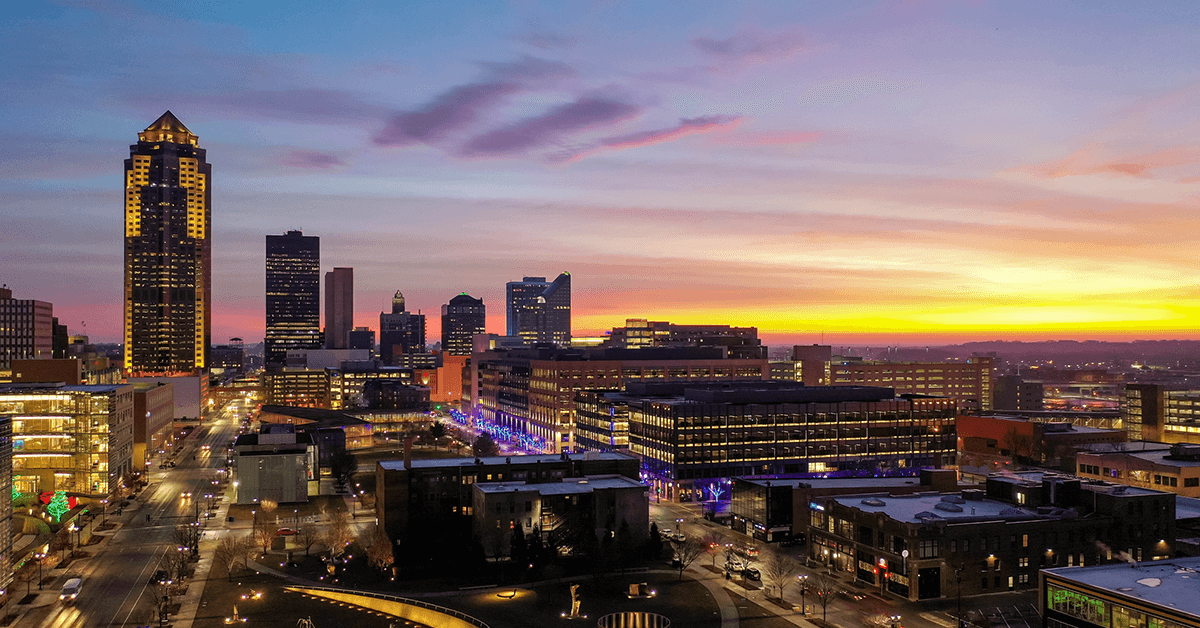
Why Millennials Love Des Moines
Millennials are flocking to Des Moines, and it’s no accident. This age group, born between 1981 and 1996 account for a whopping 15% percent of Des Moines’ population – making it seventh in the country for this metric according to the Des Moines Register’s article Des Moines is ‘Flyover Country’ No More: Millennials Choose Heartland. Millennials are drawn to Des Moines, in part, because the city has spent a fair amount of the past decade focused on attracting talented young people to the area.
The Des Moines Neighborhood Revitalization Program (NRP) began in 1990 to help stabilize and improve Des Moines neighborhoods. June of 2018 marked the second evaluation of the program and the results of this evaluation led to the 2020-2024 Consolidated Plan, which is required by the U.S. Department of Housing and Urban Development (HUD) who provides the city with entitlement to support these initiatives.
Frank Cownie, recently re-elected as the mayor of Des Moines, vowed to make improving the city’s aging neighborhoods a focus of his fifth term. He told the Des Moines Register, “It’s all about neighborhoods,” and wants to see more street and sidewalk repairs and lower property taxes for residents.
Invest DSM is a collaboration between the city of Des Moines and Polk County with the goal of bringing a renewed commitment to revitalizing neighborhoods by coordinating activities, cultivating partnerships, providing guidance for program funding, ensuring quality in the design and construction within the city, and building leadership among the city’s residents.
Amber Lynch, who serves as the executive director of Invest DSM said, “Neighborhoods are places that are very personal to people. They’re places where you spend a lot of your time, and so I think there’s something really valuable about making sure that neighborhoods are places that people are proud to call home.”
These investments are paying off and have made living in Des Moines appealing to millennial homebuyers. Here are three reasons why millennials are loving Des Moines.
1. Low Cost of Living
One of the reasons Des Moines ranks well in the Cost of Living Indexes are the relatively high salaries in comparison to housing affordability. The Des Moines Register notes, “home prices are just 2.8 times as high as incomes, while homes in Los Angeles and San Francisco are nearly nine times as high as incomes.” But there is more to the index figures than housing affordability – it also measures expenses like food, utilities, transportation, and health care.
Jay Byers, CEO of the Greater Des Moines Partnership said, in a Des Moines Register article, “The combination of higher wages and lower costs gives metro Des Moines residents the ability to enjoy and support things like concerts and recreational activities, and even to start new businesses.”
2. High-Tech Job Growth
Des Moines’ high-tech job sector is drawing young tech-savvy professionals inland and away from traditional high-tech hot spots like San Francisco and Seattle. High tech jobs in Des Moines have increased by 58% over the past decade.
Just as Iowa’s leaders have driven the success of projects like Des Moines’ Neighborhood Revitalization Program, they have also targeted the growth of tech industries. Gail Kotval, liaison of the Economic Development Authority Innovation Council, said state leaders have been looking to advance the bioscience industry in the state since 2004 and have since added manufacturing, information technology, and education technology to the list of areas for investment.
It’s advances like these that have Des Moines listed, along with 34 other cities, as potential innovation hubs by Brookings Institution and the Information Technology and Innovation Foundation.
3. Sense of Community
Although it’s harder to measure, in any concrete way, how much a city provides a sense of community, smaller metro areas like Des Moines provide millennials with opportunities for civic engagement. Greg Lin, a millennial and recent transplant to Des Moines told the Des Moines Register, “The accessibility of people in Des Moines has proved to be more than I had hoped.” Lin was invited to join several boards and developed a large network of friends within months of moving to the area.
Byers says, “While we’re a mid-major region and community, we’re still small enough that you can come here and be successful and have the opportunity to have a successful career and rewarding quality of life.” And for many millennials, that seems to be enough to shift their home searches away from traditional major metro areas and into the heartland.
Time to Focus on Affordable Housing
Taxes on real estate are not the answer. Sign the petition calling on Congress to address our country’s housing shortage.





